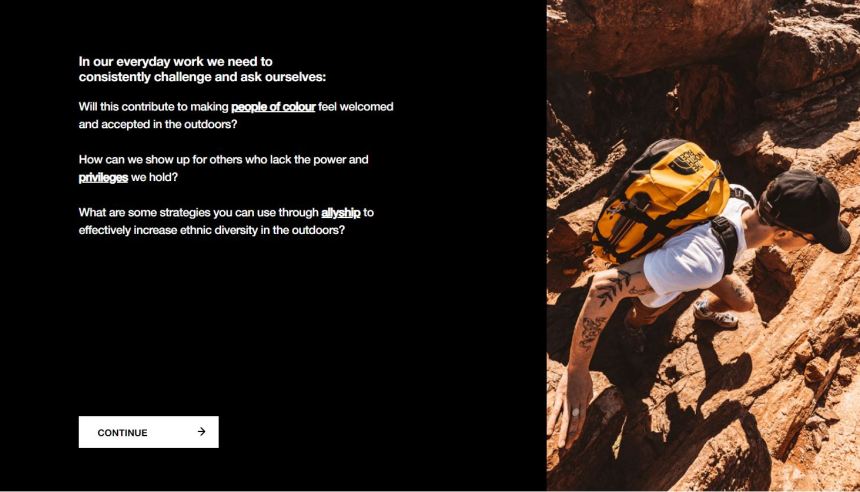The North Face has offered 20% off to customers for passing an online “racial inclusion” course.
As reported in the Times, the company, which is owned by U.S. listed VF Corporation, is offering the course to customers who are happy to learn woke dogma by rote in exchange for slightly discounted access to its outdoor clothing range. Don’t all rush at once. The fashion brand promises the discount if people complete the four-module digital “racial inclusion” course, titled “Allyship in the Outdoors”, by correctly answering a series of multiple-choice questions.
Before they begin, customers are told: “[The course] will also provide training and resources to help you be a better ally and to make the outdoors a safer and more welcoming place for everyone.”
During this hour-long trudge through the intellectual wastelands of social justice theory, customers are told to listen to other people’s “lived experiences” and “commit to being an ally in the outdoors”. The outdoors is for everyone, the company reveals.
Those taking the course are given a quiz, with correct answers including: “Equity helps eradicate prejudice and discrimination.” As distinct from ‘equality’ and the idea of ‘fairness for all’, the divisive concept of ‘equity’ is increasingly being deployed in the U.S. to discriminate against one group of people – usually white people – in favour of another – usually black people. Why? Because as the now disgraced Critical Race Theorist Ibram X Kendi explains, “the only remedy to past discrimination is present discrimination”.
Another correct answer in The North Face’s quiz – to a question about being made to feel safe and welcome outdoors – is “knowing there are allies present”.
Later modules include topics such as “white privilege” while customers are asked: “How many people of colour do you see on the slopes, on the hills or on the trails?”
Another segment argues that “privilege can give us access to the outdoors”.
“In this context,” the programme explains, “we refer to ‘white privilege’ meaning that your race and skin colour can give you access to the outdoors when others can be excluded because of historic, enduring racism and biases.”
Participants are also told: “There is no explicit policy that excludes people from the outdoors yet there are few people of colour. While there is no intent to exclude, the system in itself creates those barriers to participation.”
The programme even gives a scenario where a participant should file a complaint to their bosses if colleagues brand them “woke”.
Customers completing the hour-long course are then given three ‘reflective’ questions to ponder: “In our everyday work we need to consistently challenge and ask ourselves: Will this contribute to making people of colour feel welcomed and accepted in the outdoors? How can we show up for others who lack the power and privileges we hold? What are some strategies you can use through allyship to effectively increase ethnic diversity in the outdoors?”

A reading list of resources suggests Why I’m No Longer Talking to White People About Race by Reni-Eddo Lodge and How to Argue with a Racist by Adam Rutherford. Another recommendation is the essay White Privilege: Unpacking the Invisible Backpack by Peggy McIntosh.
At the end of the course, customers are able to claim their 20% off voucher. The programme says: “To thank you for being an ally and completing the full course, The North Face is pleased to offer you a one-off 20 per cent discount, to be used on The North Face website.”
Speaking to the Times about The North Face dabbling in the divisive, race baiting identity politics of the U.S. higher education system’s grievance studies sector, FSU General Secretary Toby Young said: “Next thing we know, they’ll be hiring Dylan Mulvaney as a brand ambassador. If I was an investor in North Face, I’d be selling my shares.”
In 2017, the Guardian reported that more than 500 workers collapsed from exhaustion during the prior year in Cambodian factories that produced clothing for VF Corporation. The report noted that the workers, who were mostly women, were subjected to 10-hour shifts, six days a week, in temperatures that often exceeded 100 degrees Fahrenheit.
In Bangladesh, garment workers recently faced violence and threats from factory owners and police as they protested for wages high enough to meet their basic needs amid soaring inflation. Reports say four workers have been killed and hundreds injured during the clashes, with factories now blacklisting workers suspected of involvement in the protests. According to Vogue Business, what has shocked labour activists most about the situation is the continued silence from fashion brands like VF Corporation that keep those factories running. In response to a question from Vogue about whether it would increase the prices written into its buying contracts to enable suppliers to pay higher wages to workers, VF declined to comment.






